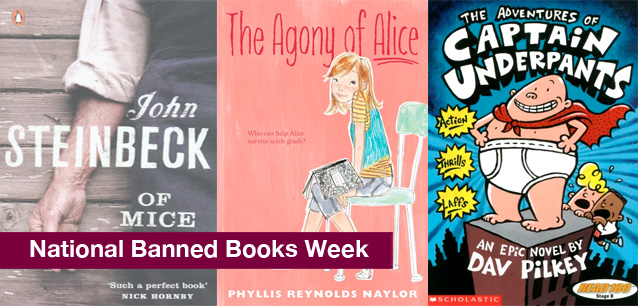 AD
AD
Today is: December 25
Scroll to explore events active on this date.
LEEP INK FEATURES

August? Absolutely!
In August, we live through the Dog Days of Summer. It's hot and often humid, and those who can leave for better climates do. Down south, winter is in full force. August is also known as "the ...

In The Heat of July: July 2025 Events
Is it hot enough (or cold enough if you're below the equator) for you yet? There is actually a day for that! Like every month, I pick a diverse collection of events you may or may not know about. This ...

May Blooms: Events in May 2025
Along with October, May is one of the most densely packed months of the year. It's before the summer humidity and the last whole month of the school year. The weather is warming in t...
About National Banned Books Week
Politics , Books
Civil Rights , United States
Ends: Sep 27, 2025
DESCRIPTION:
Banned Books Week focuses on what those in power try to prevent others from learning, thinking, or believing and the importance of supporting the freedom to read. After all, without that freedom, the world would still be flat, evolution would be extinct, and the planet would be just 5,500 years old.
Americans used to believe we live in a world where books are no longer banned. Unfortunately, that assumption has never been the case. The focus in recent years has been on "Young Adult Readers," children in junior high and high school. Though some topics and subjects, particularly those dealing with sexuality, are generally removed from children's libraries, limiting accessibility to inappropriate material for an age group is not banning. The material is still easily accessible to those of an appropriate age.
The process of banning books seeks to remove a book from society entirely because the book contradicts or challenges dominant religious views, is political, doesn't support a nation's cultivated heritage (its self-propaganda), or touches on topics people in power wish to suppress, like socialism, human rights, or climate change. Banning books is a story as old as parchment. Lately, the story has taken a twist.
There is increased vigor by several states in the United States to ban books, mentions, or instruction in school and public libraries relating to non-white lived experiences and the controversial emerging fields of gender studies. In some cases, the targeted books contain sexually explicit information that many parents believe is inappropriate for children prior to puberty. In other cases, the targeted books seek to educate at age-appropriate levels a less-than-ideal portrayal of American history, which some parents find offensive. The argument over what children can and cannot read continues, becoming a dog whistle topic for the 2024 elections.
However, book and idea banning are nothing new. Historically, there are millions of examples. Current international examples include
Israel's targeted removal of Palestinians and their history from its school books.
The banning of non-Islamic religious texts and ideas in several Gulf nations.
China's erasure of anything to do with the Tiananmen Square Massacre from books, instruction, and media.
Book banning is a universal tactic to enforce societal compliance and limit the spread of ideas that may challenge the status quo. The freer the society, the fewer the bans. The more bans, the more authoritarian the society and the tighter its control on its citizens. Ultimately, bans, including book bans, are about knowledge—who gets it and who can be controlled by its absence.
VIDEOS
Currently, this event does not have supporting videos.
SUPPORTING DOCUMENTS
Currently, this event does not have supporting documents.
ADDITIONAL IMAGES
Currently, this event does not have supporting images.
Where would you like to go now?
 AD
AD


/footer-logo.svg)
